Python beyond Python Critical Engagements with Culture
By: Hannah Fields

Outlandish, funny and absurd, Monty Python has been making people laugh since the 60s. The comedy troupe, made up of members John Cleese, Eric Idle, Terry Gilliam, Terry Jones, Graham Chapman and Michael Palin, are known worldwide for their comedy sketches and movies such as "Monty Python and the Holy Grail."
Their influence has been so great that many researchers have written countless papers examining each sketch, film and the spaces in-between. However, it is the individual careers of the men after Monty Python that often gets overlooked. It was this gap in research that inspired Texas Tech popular culture librarian Rob Weiner to spearhead a book that might fill in the missing pieces.
"There are already a lot of academic books on Python," Weiner said. "My vision was to look at the solo works and things that really weren't out there. There are some guides to their work outside of Python—before and after Python—that doesn't entail Monty Python properly. Not an academic work specifically."
With the help of Lynn Whitfield, associate archivist in the Southwest Collection/Special Collections Library, and Paul N. Reinsch, professor of practice in film in the School of Theatre and Dance, the three co-edited "Python beyond Python: Critical Engagements with Culture." The scholarly work, composed of thirteen essays from various contributors (including Weiner and Reinsch), covers each member of Python, some in multiple essays.
"It contributes to the study not only of Monty Python, but the culture of comedy and the contributions of the group beyond Python proper," Weiner said. "Everything from Terry Jones' history work to Michael Palin's diaries to John Cleese's business training videos to writings on tabloid culture and what that means in Britain."
Referring to Monty Python as the second British invasion, Weiner argues that Python is the most important comedy troupe in history, their influence still being felt across the spectrum in programs like "Saturday Night Live," "Seinfeld" and "Mystery Science Theater." Despite having the air of dry British humor, Americans still embraced the troupe, making them a longstanding facet in our culture.
"Members of Monty Python were willing to be outlandish, over the top, act outside cultural norms, and to laugh at themselves," Whitfield added. "They poked fun at the everyday rigidity of life. The viewing audience loved it and embraced it, as did the television industry itself."
To see an idea that sprouted ten years ago come to fruition is something Weiner says he's immensely proud of, especially in a field where people oftentimes may have the same ideas.
"I think that's always the struggle when you're doing research as an academic," Weiner said. "Other people have the same ideas, whether it's in science or the humanities or social sciences. To be able to see the vision you have become a reality is the most satisfying thing about doing projects like this."
When asked what they hope "Python beyond Python" accomplishes, Reinsch summed it up
best, saying that they hope the volume contributes to scholarship on both Monty Python
and the careers of its individual members outside the troupe.
"As I argue in the introduction, terms like 'Pythonesque' circulate in popular culture. And, while such terms demonstrate the influence of Monty Python, they can also obscure the critical and creative work from members before and after creating the group," Reinsch said. "Additionally, the profound influence of the group's work in television, movies and record albums, often results in audiences and critics misreading the work of individual members. Our goal was not to be the last word in Python scholarship, or about any of the individual members. We, and the contributors, desire to alter the Python discourse and create some new conversations."
Discoveries
-
Address
Texas Tech University, 2500 Broadway, Box 41075 Lubbock, TX 79409 -
Phone
806.742.3905 -
Email
vpr.communications@ttu.edu
